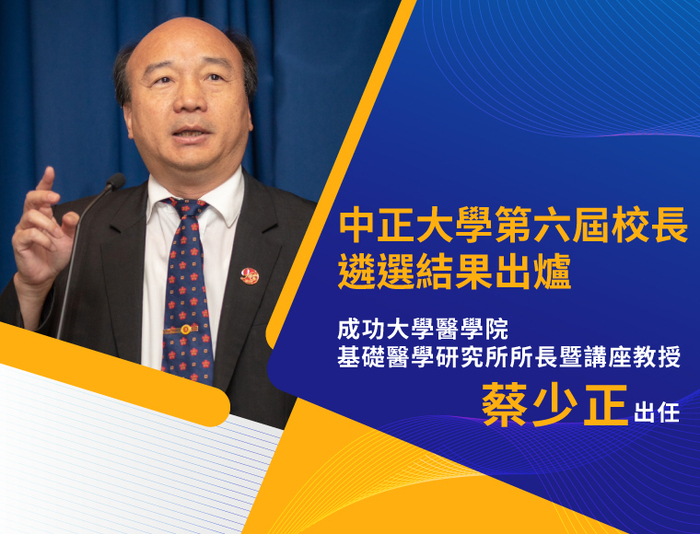Appointment of Professor Shaw-Jenq Tsai as the New President of National Chung Cheng University

The selection process for the sixth president of National Chung Cheng University (CCU) concluded
on October 31. After a six-month, three-stage evaluation within the university, Shaw-Jenq Tsai
emerged as the final candidate and was elected as the new president. Pending approval from the
Ministry of Education, Tsai is expected to assume office in February of the coming year.
In order to familiarize faculty and students with the managerial philosophies of the presidential
candidates, the CCU Presidential Selection Committee organized a presidential candidate
presentation on September 19. Five candidates were invited to articulate their visions and approaches
for the future administration of CCU. Subsequently, on October 3, the University-wide Approval
Voting was conducted among the full-time faculty members. Out of a total of 507 eligible voters
within the university's official teaching staff, 102 participated in the voting. The results revealed that
all five candidates secured 1/5 of the approval votes, meeting the threshold to advance as candidates
into the third stage of the selection process.
After the third stage of the selection process on the 31st, following interviews with 20 attending
committee members and the five presidential candidates, the CCU Presidential Selection Committee
conducted a vote for each candidate, as per the regulations outlined in the organization and operation
guidelines of the committee. The committee specified that the new president must secure approval
from at least two-thirds (inclusive) of the attending members. In this instance, Shaw-Jenq Tsai, the
Director and Professor of the Institute of Basic Medical Sciences (IBMS) at the College of Medicine,
National Cheng Kung University (NCKU), received more than two-thirds of the approval votes. As a
result, he has been selected as the new president of CCU. The appointment is subject to submission
for approval by the Ministry of Education and is expected to take effect in February 2024.
CCU states that among the five presidential candidates, there were professors from the IBMS at
NCKU, the Department of Information Management, the Department of Law, the Department of
Earth and Environmental Sciences, and the College of Artificial Intelligence at the National Yang
Ming Chiao Tung University (NYCU). The newly appointed president, Shaw-Jenq Tsai, was
previously the Director and Professor of IBMS at NCKU. He has received recognition such as the
65th Academic Award from the Ministry of Education in 2022, became a fellow of the International
Union of Physiological Sciences in 2022, and has also served as the Director of the Life Sciences
Division at the Ministry of Science and Technology.
According to the candidate profile of Shaw-Jenq Tsai, he systematically outlined various strengths of
CCU. These include the College of Science's emphasis on theory combined with industry
collaboration, robust research capabilities in the humanities and social sciences, a track record of
producing talented individuals in the College of Management, and pioneering efforts in crime
prevention and adult education. In addressing the current challenges faced by CCU, such as changes
in the international environment, the university's remote geographical location, and the impact of
declining birth rates, Tsai proposed several strategies. These strategies aim to overcome limitations
in development, mitigate talent loss, and address difficulties in student recruitment. In the academic
and research domains, he advocates for the encouragement of organized research teams, securing
research funding, and planning substantial scholarships to incentivize students in integrated
bachelor's and master's as well as doctoral programs. Focusing on the local context, Tsai expressed
intentions to leverage the university's strengths in science and technology to assist in the agricultural
transformation and upgrade. Additionally, he proposed the development of local agricultural
specialties, guiding student dormitories through transformation, and aligning with the
groundbreaking of the Chiayi Science Park this year to strengthen developments in precision health
and related fields.
In addition, Tsai also proposed to establish connections with international resources, actively recruit
international students, forge partnerships with sister schools, and enhance the university's
endowment while improving teaching and research facilities. He emphasized the goal of creating a
campus where both faculty and students find joy in learning. Tsai envisions CCU as a nurturing
ground for cultivating outstanding talents with creativity, execution capability, and leadership skills.

